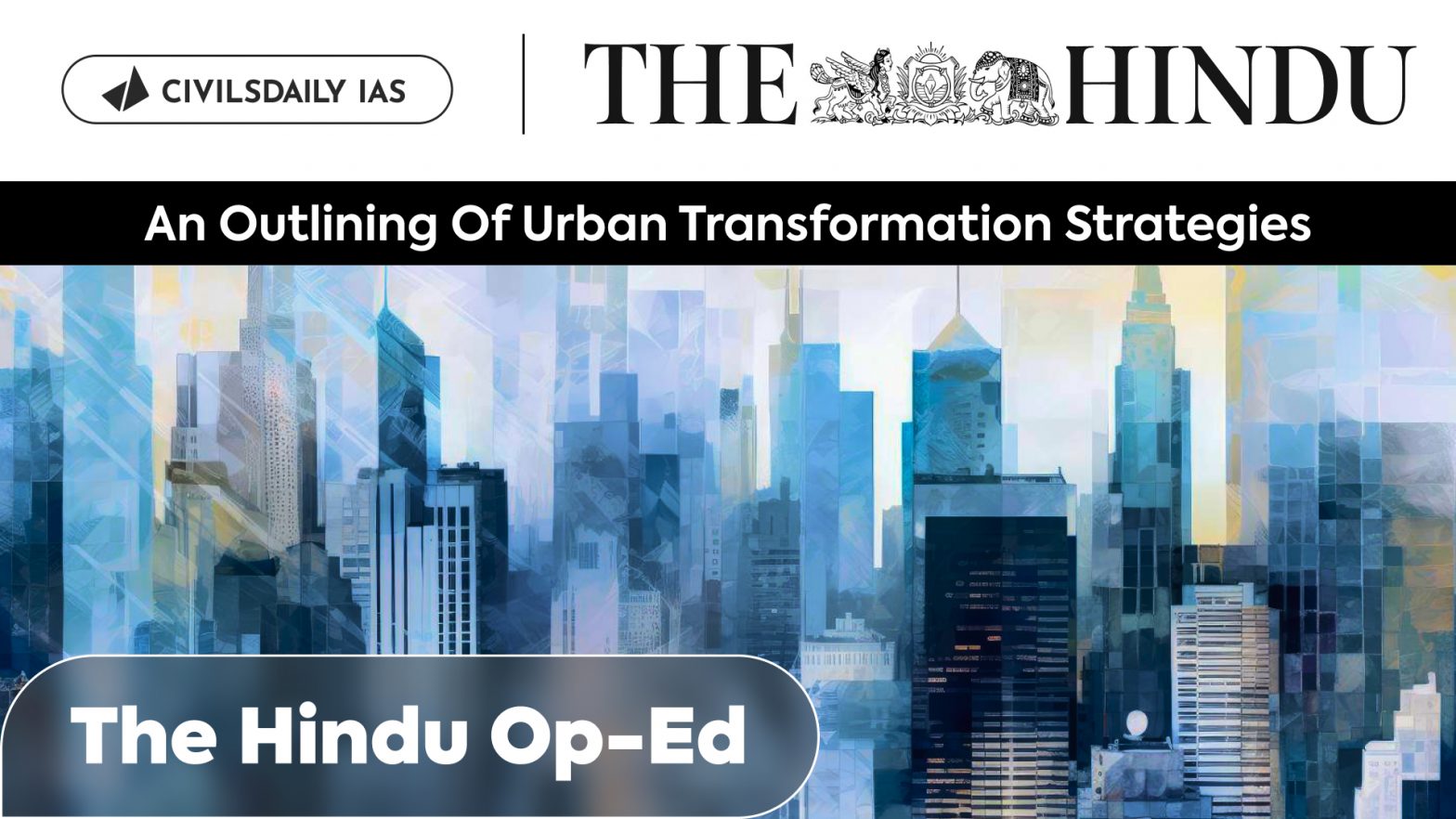| PYQ Relevance: Mains: Q1 What are ‘Smart Cities’? examine their relevance for urban development in India. Will it increase rural-urban differences? Give arguments for ‘Smart Villages’ in the light of PURA and RURBAN Mission. (UPSC IAS/2016) Q2 The frequency of urban floods due to high intensity rainfall is increasing over the years. Discussing the reasons for urban floods, highlight the mechanisms for preparedness to reduce the risk during such events. (UPSC IAS/2016) Prelims: Q With reference to ‘Asia Pacific Ministerial Conference on Housing and Urban Development (APMCHUD)’, consider the following statements (2017) 1. The first APMCHUD was held in India in 2006 on the theme ‘Emerging Urban Forms — Policy Responses and Governance Structure’. 2. India hosts all the Annual Ministerial Conferences in partnership with ADB, APEC and ASEAN. Which of the statements given above is/are correct? (a) 1 only (b) 2 only (c) Both 1 and 2 (d) Neither 1 nor 2 |
Note4Students:
Prelims: Initiative related to Housing in India;
Mains: Issues related to Urbanisation;
Mentor comments: Urban planning in India focuses on managing rapid urbanization, which has seen the urban population grow from 62.4 million in 1951 to 377.1 million in 2011, projected to reach 590 million by 2030. Key challenges include inadequate infrastructure, housing shortages, and solid waste management. The government is promoting initiatives like the Pradhan Mantri Awas Yojana and Smart Cities Mission to enhance urban livability and sustainability, emphasizing public participation and financial investment in urban infrastructure.
Let’s learn!
__
Why in the News?
The new government’s first Budget has acknowledged cities as key growth hubs and provided numerous opportunities and options for their planned development and expansion.
Initiative related to Housing in Budget (2024-2025)
- Pradhan Mantri Awas Yojana (Urban): Launched in 2015, the scheme has successfully provided 85 lakh housing units for Economically Weaker Sections (EWS) and Middle Income Groups (MIG) with an investment of approximately ₹8 lakh crore.
- The Budget allocates ₹30,171 crore for the current year to support the construction of housing units and provide interest subsidies to facilitate affordable loans for beneficiaries.
- New Rental Housing for Industrial Workers: The Budget introduces plans for new rental housing with dormitory-type accommodations for industrial workers, developed through public-private partnerships (PPP) with financial support under the Viability Gap Funding (VGF) scheme.
- Core Infrastructure Development: The Atal Mission for Rejuvenation and Urban Transformation (AMRUT) is allocated ₹8,000 crore to enhance essential urban infrastructure, including water supply, sanitation, roads, and sewerage systems.
- Investment in Urban Infrastructure: A significant investment of ₹11.11 lakh crore is earmarked for capital expenditure in infrastructure, which includes provisions for urban development.
- Smart Cities Mission: The Budget provides ₹2,400 crore for the Smart Cities Mission, which has seen a reduction in funding compared to previous years, focusing on completing existing commitments.
| Issues related to housing in India: • Housing Shortage: India faces a significant housing deficit, with approximately 19 million households lacking decent housing in urban areas, contributing to a slum population of 65.5 million living in 13.7 million slum households in major cities like Mumbai and Delhi. • Affordable Housing Crisis: The gap between housing demand and supply has led to the proliferation of slums. The 2011 Census indicates that 4.5 lakh homeless families and a total of 17.73 lakh individuals are living without any roof over their heads. • Urbanization Pressure: Rapid urbanization is putting immense pressure on urban resources. The urban population in India is projected to nearly double between 2018 and 2050, intensifying the existing housing crisis and straining infrastructure. • Environmental Degradation: Unplanned urban expansion and inadequate housing development contribute to environmental issues, such as urban heat islands, pollution, and inadequate drainage systems, leading to crises like the Chennai floods in 2015. |
Budget on Urban Planning:
- The Budget has declared a focus on the planned development of cities, recognizing the importance of strategic urban planning.
- Municipalities will receive the normal ‘Finance Commission Grant’ of ₹25,653 crore to support their development initiatives.
- On Transit-Oriented Development: The development of mass rapid transit systems in cities will enable transit-oriented development, allowing for denser development around transit hubs without overburdening roads.
- The Budget has announced an enhanced focus on economic and transit planning, emphasizing the orderly development of peri-urban areas through town planning schemes.
- On Electric Bus Systems: The Budget proposes encouraging the adoption of electric bus systems in cities, providing ₹1,300 crore in support.
Budget on Solid Waste Management:
- Government Initiatives: The Budget has announced a special thrust to introduce bankable projects for solid waste management in collaboration with state governments and financial institutions. This indicates a commitment to improving waste management systems.
- Viability Gap Funding (VGF): States and municipalities can utilize the Viability Gap Funding (VGF) to support SWM projects, making it financially feasible for local governments to implement effective waste management solutions.
| Successful Models: Cities like Indore in Madhya Pradesh have demonstrated successful models of solid waste management, showcasing that SWM can be a financially viable proposition. Indore has been recognized for its effective waste segregation and processing systems. |
- Street Vendors and Urban Planning: The Street Vendors Act, 2014, aims to regulate street vending and protect the rights of vendors, which can contribute to organized waste management in urban areas. The Budget proposes the development of 100 weekly ‘haats’ or street food hubs, which can be integrated into broader waste management strategies.
Way forward:
- Integrated Housing Policies: Develop integrated housing policies that address the entire housing continuum, from emergency shelters to affordable housing, to bridge the gap between demand and supply.
- Sustainable Urban Development: Implement sustainable urban development practices, focusing on environmentally friendly infrastructure, green spaces, and resilient housing to mitigate environmental degradation.

